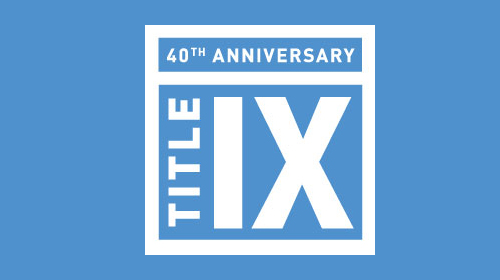
Though it’s been 40 long years since Title IX was passed, discouraging stories continue to pop up all around the country that show that many people just don’t want to implement this groundbreaking law. In 2009, Quinnipiac University in Connecticut decided to cut funding for their Women’s Volleyball team. This put them in direct violation of Title IX, a federal law that requires educational institutions to provide equal opportunities to participate in activities, including sports, for female and male students, and the ACLU of Connecticut sued on behalf of the former coach and women’s volleyball players. But Quinnipiac claimed they weren’t restricting opportunities to women athletes. They claimed compliance with Title IX by triple-counting female cross country runners – who were also on the rosters of track and field teams – even if they didn’t actually compete. And to top it off, they claimed to have replaced volleyball with a suitable alternative: they installed a competitive cheerleading team in its place.
Don’t get me wrong. Competitive cheerleading requires great feats of strength, endurance and flexibility that would make any human being reasonably envious of a competitive cheerleader’s athleticism. But a sport, under Title IX, must have a clearly defined season, regulations for coaches and athletes, and a governing body that makes sure that everyone is following the rules. Competitive cheerleading doesn’t qualify. It’s just not right to assume that volleyball, a highly regulated sport that is respected enough to make it into this summer’s Olympics (good luck to Team USA, playing Brazil for gold tomorrow!), can be adequately replaced by competitive cheerleading.
So in 2010, Judge Stefan Underhill ruled that Quinnipiac had violated Title IX and prevented the university from eliminating any women’s athletic teams. Not willing to understand that cutting women’s volleyball was a violation of students’ rights, Quinnipiac appealed the decision. On Tuesday, the U.S Court of Appeals for the Second Circuit upheld Underhill’s decision. This is a fantastic victory for everyone because it ensures that student athletes have equal access to venues in which they can show off their bumps, sets and spikes.
Until competitive cheerleading develops the qualifications needed to become a sport under Title IX, it just isn’t right to equate women’s volleyball with competitive cheerleading. Maybe one day, we can see competitive cheerleading develop into a regulated activity. But until then, Quinnipiac should continue to respect the provisions of Title IX. Hopefully, officials at Quinnipiac will begin to see the women’s volleyball team in the light I do – as athletes deserving of funding and praise.
Learn more about Title IX: Sign up for breaking news alerts, follow us on Twitter, and like us on Facebook.



